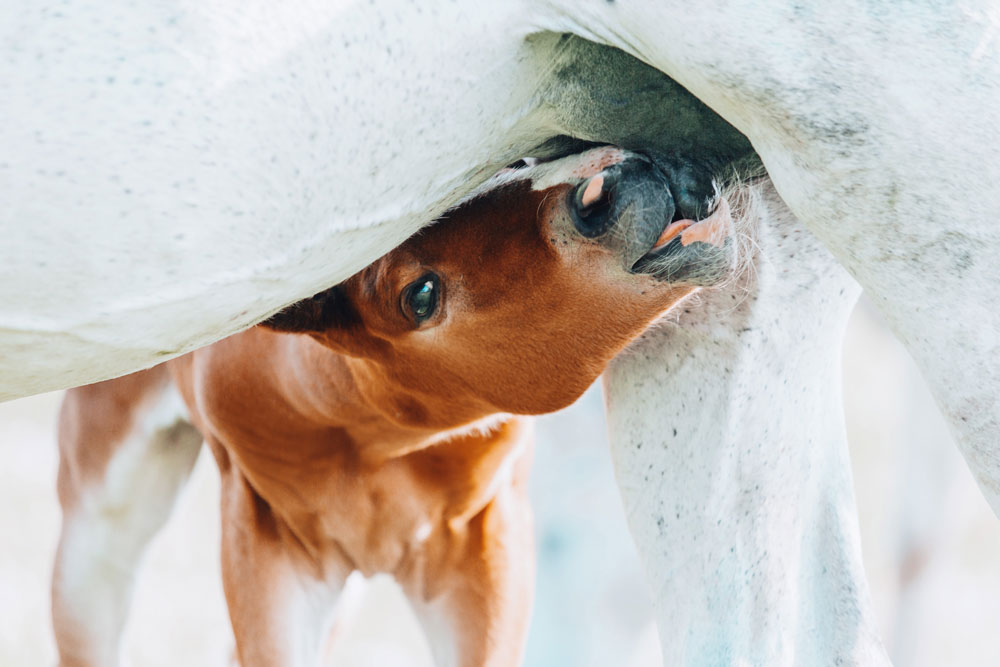There’s a lot of conventional wisdom out there about diagnosing and treating ulcers – yet ulcers continue to be a prevalent problem for horses. The “Your Horse Ulcer Free” series will equip you with the knowledge to recognize, treat, and ultimately prevent equine ulcers in a better, more lasting way.
Be sure to check out the other articles in the series for an overview of equine ulcers, gastric ulcers, colonic ulcers, diagnosing, and treating equine ulcers. Today we’re talking about what you can do to help your horse reduce its risk for ulcers before they occur.
Whether or not your horse has a history with ulcers, it’s important to implement practices that will help reduce your horse’s risk for developing gastric and colonic ulcers. Prevention is especially critical for horses in stressful situations, which can be anything from serious competition, to moving to a new barn, to being primarily stalled, to something as simple as a change in pasture mates.
Understanding some of the primary reasons horses get ulcers is key to knowing how to prevent them in the first place. The way we feed and care for horses is very different from how they live in the wild, which makes them more prone to digestive issues like ulcers. These are some of the common problem areas:
- feeding 2-3 large meals a day
- large grain/processed feed meals
- limited turnout
- training, travel, and competition
Addressing these root causes is the best way to keep your horse-ulcer free for the long-haul.
Top Feeding Tips For Preventing Equine Ulcers
Stopping equine ulcers before they start begins with your horse’s diet.
Feed plenty of forage
Horses are hindgut fermenters, which means their digestive tracts are built to get most of their energy from digesting structural fibers in the colon with the help of beneficial microorganisms. What are structural fibers? Forages like grass, hay, and beet pulp.
Unfortunately, high-quality forages aren’t what we typically turn to when we have a horse with greater energy or weight requirements. The starchy grains and processed feeds we add to the diet can be hard on the equine digest tract, and when fed in a few large meals a day can lead to ulcers.
Keeping a constant supply of forage going through your horse’s system has several key benefits:
- the constant trickle of fibrous food through the stomach, as well as the saliva from chewing, buffers the acids that can damage the stomach’s protective lining
- it makes horses less likely to bolt their meals, which is a primary way that grain moves too quickly and reaches the hindgut undigested
- it helps the horse to receive as much energy as possible through fibers fermenting in the hindgut
Tip: Soaked beet pulp has the same caloric value as oats. However, it is fermented in the hindgut. Win-win!
Feed multiple small meals
For some horses that are exercised rigorously or are particularly hard-keepers, some type of grain or processed feed is necessary. If your horse needs grain to meet nutritional or energy requirements, it’s better to feed in multiple small meals throughout the day rather than two large ones. We generally recommend that you give your horse no more than 5 pounds of processed feed in one meal. Here’s how this can help:
- smaller amounts of feed going through the system at a time helps to ensure that starches in grain are digested and absorbed in the small intestine – before reaching the hindgut
- feeding more forage and less grain keeps undigested starch out of the hindgut where it can disrupt the delicate balance of microflora
Increase chewing time
One of the best ways to protect your horse’s digestive tract is to slow how quickly it ingests food by forcing it to take longer to chew. One way to increase chewing is to mix chaff, or chopped hay, with your horse’s grain meals. Increasing chewing time produces more saliva to buffer stomach acids. It also slows grain intake, again, keeping undigested starch from reaching the hindgut.
Next Step: Enjoy Your Healthy Horse
Hopefully you are now well-equipped with a basic understanding of the types of equine ulcers and their diagnosis, treatment, and prevention. Now that you’re armed with this knowledge, you can provide your horse with the lifestyle to stay ulcer-free for the long-haul. And a healthier horse means a happier horse capable of performing its very best.



